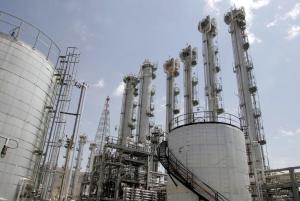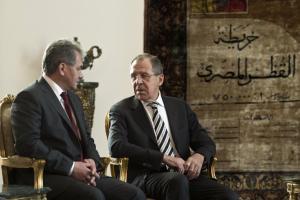By Steve Weizman
Jerusalem (AFP) - At odds with ally Washington over an emerging nuclear agreement with Iran, Israeli Prime Minister Benjamin Netanyahu will on Wednesday take his campaign against the deal to Moscow.
Russia is a member of the P5+1 group -- alongside the United States, China, France, Britain and Germany -- which has been struggling to reach a deal to freeze or curb Iran's nuclear activities in exchange for some relief from international sanctions.
Israel is staunchly opposed to the mooted interim agreement, insisting it will give Iran vital sanctions relief while failing to halt Tehran's alleged march towards a "breakout" nuclear weapons capability.
"We'd like (the Russians) to have a better understanding of our concerns and the need to prevent Iran from having a breakout capacity," an Israeli official told AFP ahead of the trip.
"A breakout capacity means that they have the capability to develop a nuclear weapon at a time and a place of their choosing in the future."
The P5+1 will meet with Iran on Wednesday in Geneva for talks on the nuclear programme, which Israel and the West suspect is aimed at developing a weapons capability but Tehran insists is entirely peaceful.
The last round of talks with Iran, which ended on November 10, came tantalisingly close to a framework agreement that supporters say would bolster Iran's new president, a reputed moderate, and buy time for negotiating a comprehensive agreement.
Moscow has expressed hope the differences could be ironed out, with President Vladimir Putin telling his Iranian counterpart Hassan Rouhani on Monday that "a real chance has now emerged for finding a solution to this longstanding problem."
US Secretary of State John Kerry has also expressed hope for a "first-step" agreement that "can prove to the world that this is a peaceful programme."
Netanyahu vehemently opposes the proposed deal, which he says would prematurely ease sanctions against Iran without getting it to halt uranium enrichment or stop work on a heavy-water reactor.
"You are not really dismantling any capacity to make fissile material for nuclear weapons," he said in an interview published in top-selling German daily Bild on Tuesday.
"Iran gets to keep all its centrifuges. Thousands of them. It makes a minor concession that it can reverse in weeks. And what are the P5+1 giving Iran? They are giving it reduced sanctions which could very quickly lead to the crumbling of the entire sanctions regime."
'Divorced from reality'
Netanyahu raised the issue this week with visiting French President Francois Hollande, who assured him that France "will not tolerate nuclear proliferation."
But Russian Foreign Minister Sergei Lavrov has made clear he finds Netanyahu's barbs off the mark, saying "certain critical statements" on the mooted agreement were "divorced from reality."
"Those who suspect Russian, American and other participants of the process" of allowing dangerous loopholes in the agreement are "disrespecting our intellectual capacities and our political principles," he told state-run media on Monday.
The visit comes amid a growing US diplomatic vacuum in the Middle East, stemming from Washington's lack of will to flex its muscles in the wake of costly wars in Iraq and Afghanistan.
Moscow appears keen to fill that void -- an impression which was reinforced last week when Lavrov and Defence Minister Sergei Shoigu went to Cairo for a visit devoted to military and diplomatic ties.
Netanyahu's opposition to the nuclear deal and his public spat with Kerry over the matter have sparked warnings that it could turn into a diplomatic boomerang for Israel.
Some suggest Netanyahu may be seeking to play the Kremlin off against the White House, saying that to do so would be a mistake.
"I very much hope that he will not try such an exercise," said Amnon Sela, international relations expert from Jerusalem's Hebrew University.
"He has already taken some steps which are very harmful to Israel, with his opposition to President (Barack) Obama and trying to enlist (US) public opinion and Congress against the president."
Israel, the region's sole if undeclared nuclear-armed state, has refused to rule out military action to halt Iran's nuclear drive. Washington has also insisted it will strike if necessary to prevent Tehran from developing a nuclear weapon.



No comments:
Post a Comment